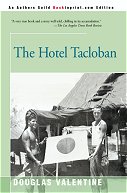From DouglasValentine.com:
In this extraordinary story of World War Two, the author’s father, who enlisted in the army at the age of sixteen, describes the terrible experiences that affected the course of his life. Captured by the Japanese while on patrol in the fetid jungles of New Guinea, he was sent to a prison camp in the Philippines, where he was interned with Australian and British soldiers. A celebration of camaraderie, and a testament to “the soldier’s faith”, this is a story of murder, mutiny, and an incredible military cover-up.
The Hotel Tacloban is available directly from the author at DouglasValentine.com and also from iUniverse.com
Reviews
“This is a very true book and story well told...chilling in its accumulation.”
— James Kaufmann
The Los Angeles Times
“A soldier’s fascinating story of wartime survival and betrayal...a shocking denouement.”
— Paul Back
literary critic
“Compelling...”
— Alison Knopf
The New York Times
“A vivid and compelling narrative...”
— Leslie Hanscom
Newsday
“This horrifying and unforgettable story is not just a searing picture of life in a terrible POW camp...(it) is also a significant historical document about a place that the U.S. military says never existed.”
— Publisher’s Weekly Forecasts
The Kennedy Miller Film Company, makers of the Mel Gibson movies Mad Max and The Road Warrior, has purchased the motion picture film rights to The Hotel Tacloban. Mr. Valentine is hoping to turn those rights over to any other interested film producers.
The Hotel Tacloban was originally published by Lawrence Hill & Company, 1984, Angus & Robertson Publishers (in Australia and the United Kingdom) in 1985, and by Avon Books in 1986.
About the Author
Douglas Valentine is an author, researcher, investigator, consultant, critic, and poet.
He was born in Pleasantville, New York in 1949, and currently lives with his wife, Alice, in Longmeadow, Massachusetts. He is a graduate of Notre Dame College in Manchester, New Hampshire, and began his career as a professional writer in 1981. His philosophy of life is derived from extensive study in classical myth and nature, and is applied through his writing to contemporary political, social, and national security issues.
Mr. Valentine’s published works to date include The Hotel Tacloban, a highly praised account of life and death in a Japanese prisoner of war camp, and The Phoenix Program, which Professor Alfred J. McCoy describes as “the definitive account” of the CIA’s most secret and deadly covert operation of the Vietnam War.
Both The Hotel Tacloban and The Phoenix Program are available through iUniverse.com, the on-demand Internet book publisher, as Authors Guild imprint backinprint books.
Mr. Valentine’s most recent book, TDY, also is available through iUniverse.com. Reviews of The Hotel Tacloban, The Phoenix Program, and TDY can be found at http://www.douglasvalentine.com/books.html
Mr. Valentine is currently completing work on his fourth book, The Strength of the Wolf: The Federal Bureau of Narcotics 1930-1968.
Apart from his writing career, Mr. Valentine has lectured and appeared on radio talk shows. He has testified as an expert witness, including at a national security-related libel trial in Geneva, Switzerland in 1992. He has served as a documentary film consultant, and in that capacity was hired by the British Broadcasting Corporation and traveled to Vietnam in 1991.
Mr. Valentine also has worked extensively as a private investigator. In 1994 he uncovered the material evidence that gave actor Woody Harrelson’s father, Charles Harrelson, the opportunity to receive a new trial in 1998. Since 1999 Mr. Valentine has worked for the family of Dr. Martin Luther King, and in November 1999 he testified at the King versus Jowers trial in Memphis, Tennessee. An article he wrote about the national security aspects of the King case is accessible through his Articles page.
Related books
Doing Battle:
The Making Of A Skeptic
by Paul Fussell
published by: Little, Brown
“Wonderfully angry memoir of an idyllic boyhood shattered by WWII, and how his war experience changed his perspective on everything that came before and after.”
“A refreshing antidote to all that romantic blather about WWII being a ’good war.’”
— Russell Baker
Doing Battle is available from:
Edward R. Hamilton, Bookseller
Falls Village, CT 06031-5000
Bloody Hell:
The Price Soldiers Pay
by Daniel Hallock
The Fire This Time:
U.S. War Crimes in the Gulf
by Ramsey Clark
Desert Slaughter:
The Imperialist War Against Iraq
by the Workers League
Apocalypse 1945:
The Destruction of Dresden
by David Irving
Saving Private Power:
The Hidden History of “The Good War”
by Michael Zezima
The Beast Reawakens
by Martin A. Lee
A People’s History of the United States:
1492 — Present
by Howard Zinn
The Decision to Use the Atomic Bomb
by Gar Alperovitz
Lies My Teacher Told Me:
Everything Your American History Textbook Got Wrong
by James Loewen
What Uncle Sam Really Wants
by Noam Chomsky
Deadly Deceits:
My 25 years in the CIA
by Ralph W. McGehee
Killing Hope:
U.S. Military and CIA Interventions Since WWII
by William Blum
Rogue State:
A Guide to the World’s Only Superpower
by William Blum
The Phoenix Program
by Douglas Valentine
Against Empire
by Michael Parenti
The Sword and the Dollar:
Imperialism, Revolution and the Arms Race
by Michael Parenti
Inventing Reality:
The Politics of News Media
by Michael Parenti
War At Home:
Covert Action Against U.S. Activists and What We Can Do About It
by Brian Glick
War, Lies & Videotape:
How media monopoly stifles truth
edited by Lenora Foerstel; multiple authors
On Killing:
The Psychological Cost of Learning to Kill in War and Society
by Dave Grossman
published by: Little, Brown
Examines the consequences of the U.S. Army’s conditioning of American soldiers to overcome the instinctive loathing of murdering fellow human beings. Shows how it has increased post-combat stress disorder and how contemporary society — especially the American media — replicates the U.S. Army’s conditioning techniques, resulting in increased violence in American society.
Available from:
Edward R. Hamilton, Bookseller
Falls Village, CT 06031-5000

